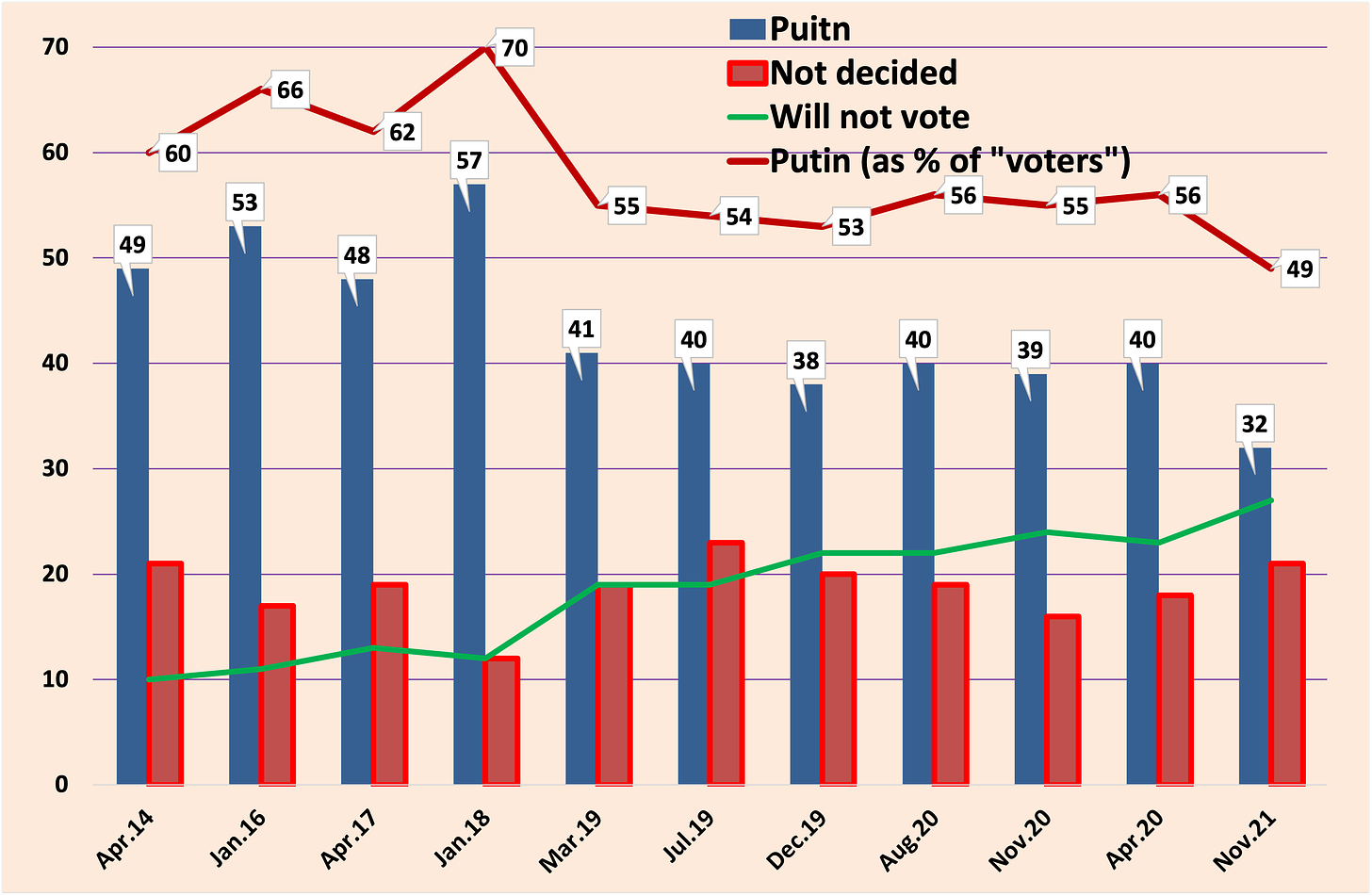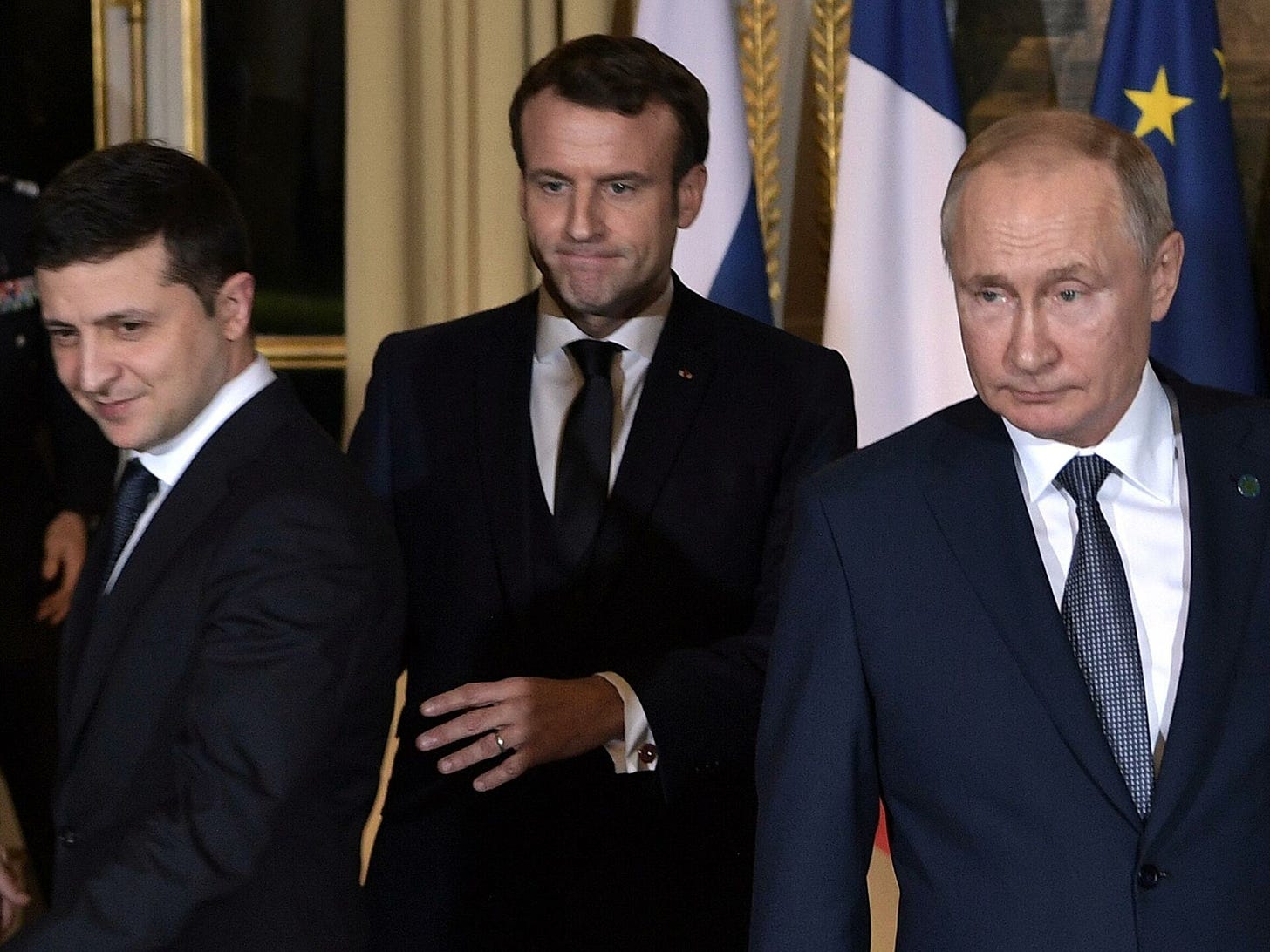Russia wants change! New red lines. Ambitious project. What is he like, a real Chekist?
December 10, 2021
Russia wants change!
The results of a Levada-Center poll show that Vladimir Putin has lost about 20% of his electorate’s support over the past ышч months. While in April 40% of Russians named him as the candidate they would vote for if elections were held now, in November only 32% of Russians chose him. Undoubtedly, we should say that Putin lost support, not any of his competitors gained it—none of the other named politicians received more than 3% of the vote.
In the control poll, less than half of those who would have voted, 49%, named Putin.
In my opinion, the main factor contributing to the drop in Putin’s rating was the failure of the government policy to combat the coronavirus and the prohibitively high mortality rate caused by the pandemic.
Of course, there is still a long way to go until March 2024, when the next pre-presidential elections will take place, and the Kremlin will be looking for a way to the voter’s heart and mind, as well as inventing new ways to falsify the election results. But the “first call” to Putin has already been made—the voter has clearly stated: Russia wants changes.
The fruits of blackmail
Vladimir Putin continues to reap the fruits of his politico-military blackmail. Following President Biden’s announcement of Russia-NATO renegotiations to discuss Putin’s “strategic concerns,” French President Emmanuel Macron said he plans to contact Putin and Ukrainian President Vladimir Zelensky next week to discuss the situation around Ukraine.
“Our desire is to interact in contact with Zelensky, whom I will see on Wednesday, and in contact with Putin, with whom I will talk next week, to revive this format (the Normandy format) and the political process in general,” Macron said at a news conference.
New red lines
After Vladimir Putin drew red lines in Europe, Russian General Staff Chief Valery Gerasimov drew his own red lines. They are in the South Pacific Ocean. Responding to journalists’ questions about Russia’s attitude toward the AUKUS bloc, he said, “The creation of blocs with a clear targeting of another state would destabilize the situation in the Asia-Pacific region.” According to Gerasimov, “the establishment of the Australian nuclear submarine fleet may become a new milestone in the struggle for regional dominance not only in the Asia-Pacific, but also in other regions of the world.”
The balance of payments has become even more strong
Russia’s current account surplus in January-November 2021 amounted to $111.4 billion, which is 3.5 times higher than in 2020 ($32.2 billion), the Bank of Russia said. This resulted from a doubling of the trade surplus due to a boom in merchandise exports caused by rising global commodity prices and a slowdown in imports [which is evidence of a slowing economy].
No wonder that over the same period, capital outflow from Russia by the private sector increased 1.5 times (to $73.9 bln). The essence of the balance of payments is that the current account surplus is necessarily compensated by the sum of the capital account deficit and the increase in state assets in foreign currency.
We won’t let Belarus offend
All banks in Belarus have joined the financial messaging transfer system (FMTS) announced by Denis Baryshkov, an employee of the National Payment System Department of the Bank of Russia. Thus, the Belarusian banking system could continue its work, provided it is disconnected from the SWIFT system.
The FMTS was created by the Bank of Russia (which is its sole owner and operator) in response to the first wave of anti-Russian sanctions in 2014.
In June of this year, First Deputy Governor of the Bank of Russia Olga Skorobogatova noted the technical readiness of the FMTS and at the same time identified the main problem in the work of this system—foreign banks don’t want to use it. “From the point of view of the domestic market, the Russian system can handle all 100% (of financial messages) without any problems at all. But from the point of view of international transfers... we need other ministries and institutions: Ministry of Foreign Affairs, Ministry of Economy, Ministry of Finance.”
FMTS and SWIFT are information transferring systems, but while over 11,000 banks in more than 200 countries participate in SWIFT, only 38 banks from nine countries joined the Russian system.
The global objective of this project, fervently supported by the Kremlin, is to create a system that allows working without SWIFT and its European counterpart, INSTEX—i.e., in complete isolation. At the end of 2019, the SPSS was integrated with the Iranian SEPAM system. Intensive work is currently under way to integrate the FMTS with the Chinese CIPS system, and negotiations are occurring with India on localizing the Russian system in that country.
This whole concept sounds nice and tempting, with only one caveat. If sanctions are imposed, such a system can sustainably operate only in national currencies (ruble, yuan, rupee), which account for a small portion of international payments. Of course, in case of comprehensive sanctions imposed by the United States and the European Union, Belarusian banks will be capable of continuing a significant part of international payments in dollars and euros, using Russian banks as intermediaries. But whether Russian banks will be able to turn to anyone for support in case of similar sanctions is not apparent to me at all.
Moscow does not need migrants
The topic of labor migrants in Russia is often the cause of heated political debates and mass unrest. On the one hand, the poor demographic situation in the country and the slow growth of labor productivity require a constant inflow of labor, especially in sectors requiring manpower with low wages. On the other hand, the Russian authorities do nothing for the actual integration of foreigners into Russian society; however, most of them are “pendular” migrants who do not seek to move to Russia permanently.
In this regard, Moscow is a complicated city, with virtually no unemployment. Moscow experiences a severe labor shortage in construction, housing and utilities, and transportation during periods of economic growth. Because foreign workers are willing to put up with a lower quality of life with lower wages, their share in these sectors exceeds 25%-30%.
According to Peter Biryukov, Deputy Mayor of Moscow, in recent years, the city authorities have been implementing a targeted program for the replacement of foreign workers by residents of regions neighboring Moscow. To this end, special dormitories for guest workers are organized in Moscow, and Russian citizens are preferred for hire.
This led to the fact that the number of foreign workers in the housing and utilities sector decreased by 40%, from 100,000 to 60,000 people in recent years. But this occurred against the background of an overall 25% reduction in the number of workers in this segment. Biryukov says that this happened “thanks to the use of new technologies, increasing productivity and organizing work production processes.” However, the heavy snowfall in Moscow this week showed that technology doesn’t help to quickly clean the sidewalks in residential areas.
Ambitious project
Alexander Bloshenko, executive director of Roskosmos, announced the readiness of the Russian lunar mission concept. “The program exists; it just costs quite a bit of money in any of the variants.”
The program is designed for the period up to 2040 and includes three stages:
—First stage (2021-2025) is “Outreach.” Testing all the technologies on the ISS, creating the basic module of the circumlunar station, and testing the prospective human-crewed spacecraft “Eagle.”
—Second stage (2025-2035) is “Outpost.” Elaboration of means of access to the Moon’s surface: manned flights with circumambulation in 2026 and landing of cosmonauts (after 2030—duration 14 days) on the surface of the Moon for creation and location of the first elements of the visited base; deployment of communication satellites on the circumlunar orbit.
—Third stage (after 2035) is “Base.” Construction of a full-scale visiting lunar base. Creation of scientific infrastructure on the surface of the Moon, two astronomical observatories (on radio astronomy and cosmic rays). Deployment of satellite navigation system on circumlunar orbit for routing of equipment working on the surface.
According to Bloshenko, the implementation of the lunar program with super-heavy rocket Yenisei will require about 1.7 trillion rubles ($23 bln.), more than half of which will be spent on “creating payloads” (spacecrafts Eagle, the lunar take-off-landing module, Moon walkers, lunar suits, scientific equipment, etc.). Another 400 billion rubles ($5.5 bln.) are devoted to Angara rockets.
The announced funding for the program makes me have doubts about its feasibility. The financing of Roskosmos civil projects for the next three years makes a little more than 200 billion rubles per year—i.e., about 40% of the annual budget should be spent on financing the lunar program. Such distribution of funds is unlikely to ensure the sustainability of other space programs in Russia.
What is he like, a real Chekist?
What do you get when you combine the Athenian strategist Aristides with Voltaire? You get Felix Dzerzhinsky, the Soviet/Russian secret police creator, the VCK/NKVD/KGB/FSB. Don’t believe it?
As recounted by Plutarch, Aristides says: “... Truly it is proper for a regimented waterman to have clean hands.” Voltaire expands on this formula: “A military commander needs a cool head and a hot heart (la tête froide et le coeur chaud).” Now we add one to the other and get the words of Dzerzhinsky: “Only a man with a cool head, a hot heart, and clean hands can be a Chekist.” [True, the revolutionary himself never said these words; they appeared in his biography, published in 1941.]





